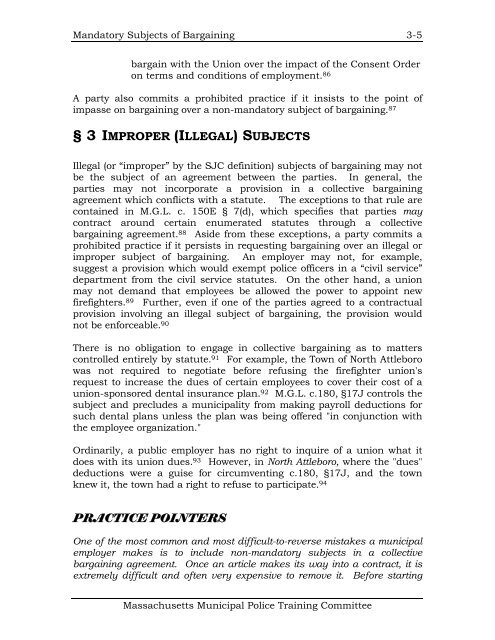Management Rights - AELE's Home Page
Management Rights - AELE's Home Page
Management Rights - AELE's Home Page
Create successful ePaper yourself
Turn your PDF publications into a flip-book with our unique Google optimized e-Paper software.
Mandatory Subjects of Bargaining 3-5<br />
bargain with the Union over the impact of the Consent Order<br />
on terms and conditions of employment. 86<br />
A party also commits a prohibited practice if it insists to the point of<br />
impasse on bargaining over a non-mandatory subject of bargaining. 87<br />
§ 3 IMPROPER (ILLEGAL) SUBJECTS<br />
Ilegal (or “improper” by the SJC definition) subjects of bargaining may not<br />
be the subject of an agreement between the parties. In general, the<br />
parties may not incorporate a provision in a collective bargaining<br />
agreement which conflicts with a statute. The exceptions to that rule are<br />
contained in M.G.L. c. 150E § 7(d), which specifies that parties may<br />
contract around certain enumerated statutes through a collective<br />
bargaining agreement. 88 Aside from these exceptions, a party commits a<br />
prohibited practice if it persists in requesting bargaining over an illegal or<br />
improper subject of bargaining. An employer may not, for example,<br />
suggest a provision which would exempt police oficers in a “civil service”<br />
department from the civil service statutes. On the other hand, a union<br />
may not demand that employees be allowed the power to appoint new<br />
firefighters. 89 Further, even if one of the parties agreed to a contractual<br />
provision involving an illegal subject of bargaining, the provision would<br />
not be enforceable. 90<br />
There is no obligation to engage in collective bargaining as to matters<br />
controlled entirely by statute. 91 For example, the Town of North Attleboro<br />
was not required to negotiate before refusing the firefighter union's<br />
request to increase the dues of certain employees to cover their cost of a<br />
union-sponsored dental insurance plan. 92 M.G.L. c.180, §17J controls the<br />
subject and precludes a municipality from making payroll deductions for<br />
such dental plans unless the plan was being offered "in conjunction with<br />
the employee organization."<br />
Ordinarily, a public employer has no right to inquire of a union what it<br />
does with its union dues. 93 However, in North Attleboro, where the "dues"<br />
deductions were a guise for circumventing c.180, §17J, and the town<br />
knew it, the town had a right to refuse to participate. 94<br />
PRACTICE POINTERS<br />
One of the most common and most difficult-to-reverse mistakes a municipal<br />
employer makes is to include non-mandatory subjects in a collective<br />
bargaining agreement. Once an article makes its way into a contract, it is<br />
extremely difficult and often very expensive to remove it. Before starting<br />
Massachusetts Municipal Police Training Committee
















